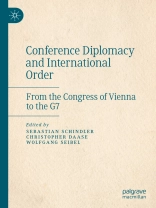This volume’s focus on establishing a direct exchange between History and International Relations is unique in the contemporary literature on international institutions. While there have been attempts in both disciplines to engage with the other and to integrate their respective insights, a direct, focused exchange on core issues of international institutional development has rarely taken place.
The volume takes this lacuna as a starting point. The structure of the volume is strictly symmetrical. In each of the four main sections, one historian and one IR scholar elaborate their views on one of four main aspects of conference diplomacy: inclusion/exclusion, effectiveness, legitimacy, and international order. This approach allows the authors to tackle the more general role of institutions in international order in a long-term historical perspective. The diagnosed crisis of contemporary, liberal order appears in a different light when viewed before the background of continuity and change in the past 200 years. This book has the potential to become essential reading for scholars and practitioners alike.
Inhoudsopgave
.- PART 1: INTRODUCTION.
.- Chapter 1: Conference Diplomacy and International Order.
.- PART 2: INCLUSION.
.-Chapter 2: Who is In and Who is Out? Inclusion and Exclusion in European Conference Diplomacy 1815–2015.
.-Chapter 3: Governing the World: Great Powers and the Dilemmas of Inclusion and Exclusion—1815, 1919, 1945, and Today.
.- PART 3: EFFECTIVENESS.
.- Chapter 4: The Effectiveness of Conference Diplomacy.
.- Chapter 5: The Effectiveness—and Limitations—of the Concert System.
.- PART 4: LEGITIMACY.
.- Chapter 6: The Legitimacy of Conference Diplomacy: A Historian’s View.
.- Chapter 7: Oligarchy and Legitimacy in World Politics: Conference Diplomacy 1815–2015.
.- PART 5: INTERNATIONAL ORDER.
.- Chapter 8: The Problem of International Order at the Versailles Conference and After.
.- Chapter 9: The Dynamics of International Order.
.- PART 6: CONCLUSION.
.-Chapter 10: Conference Diplomacy and the Future of International Order.
Over de auteur
Sebastian Schindler is Assistant Professor of Political Science at LMU Munich
Christopher Daase is Professor of International Organizations at Goethe-University Frankfurt.
Wolfgang Seibel is Emeritus Professor of Political and Administrative Science University of Konstanz.












